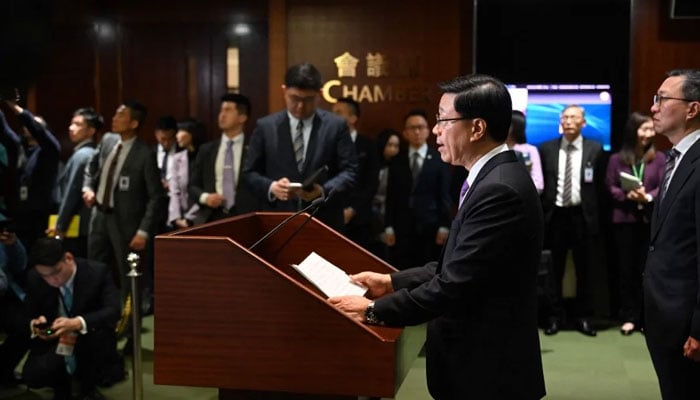Hong Kong legislature unanimously passes new national security law
Some lawmakers, however, shrugged off the risk of further sanctions and possible credit rating downgrades
HONG KONG: Hong Kong lawmakers on Tuesday unanimously passed a new national security bill within a fortnight of it being tabled, fast-tracking a major piece of legislation that critics say further threatens the China-ruled city’s freedoms.
The package, known as Article 23, punishes offences including treason, sabotage, sedition, the theft of state secrets, external interference and espionage with sentences ranging from several years to life imprisonment.
Hong Kong’s leader John Lee said the law would come into effect on March 23 and called it a “historic moment for Hong Kong”.
This new slate of laws comes on top of an earlier, China-imposed national security law that had already triggered sanctions from the United States, including against Lee.
Some lawmakers, however, shrugged off the risk of further sanctions and possible credit rating downgrades.
“We have to legislate for the security of our country and Hong Kong. Whatever comes, will come. We don’t mind,” said the head of the legislature, Andrew Leung.
Hong Kong’s Legislative Council, stacked with pro-Beijing loyalists, was first presented with the bill on March 8 following a month-long public consultation.
Authorities say the legislation is necessary to plug loopholes in the national security regime despite the enactment of the China-imposed law that has been used to jail pro-democracy activists. The new law will have extraterritorial effect outside of Hong Kong, giving rise to fears it could be used to intimidate and restrict free speech in other jurisdictions.
-
 Pentagon Threatens To Cut Ties With Anthropic Over AI Safeguards Dispute
Pentagon Threatens To Cut Ties With Anthropic Over AI Safeguards Dispute -
 Meghan Markle's Father Shares Fresh Health Update
Meghan Markle's Father Shares Fresh Health Update -
 Travis Kelce Takes Hilarious Jab At Taylor Swift In Valentine’s Day Post
Travis Kelce Takes Hilarious Jab At Taylor Swift In Valentine’s Day Post -
 NASA Confirms Arrival Of SpaceX Crew-12 Astronauts At The International Space Station
NASA Confirms Arrival Of SpaceX Crew-12 Astronauts At The International Space Station -
 Can AI Bully Humans? Bot Publicly Criticises Engineer After Code Rejection
Can AI Bully Humans? Bot Publicly Criticises Engineer After Code Rejection -
 Search For Savannah Guthrie’s Abducted Mom Enters Unthinkable Phase
Search For Savannah Guthrie’s Abducted Mom Enters Unthinkable Phase -
 Imagine Dragons Star, Dan Reynolds Recalls 'frustrating' Diagnosis
Imagine Dragons Star, Dan Reynolds Recalls 'frustrating' Diagnosis -
 Steve Jobs Once Called Google Over Single Shade Of Yellow: Here’s Why
Steve Jobs Once Called Google Over Single Shade Of Yellow: Here’s Why -
 Barack Obama Addresses UFO Mystery: Aliens Are ‘real’ But Debunks Area 51 Conspiracy Theories
Barack Obama Addresses UFO Mystery: Aliens Are ‘real’ But Debunks Area 51 Conspiracy Theories -
 Selma Blair Explains Why Multiple Sclerosis 'isn't So Scary'
Selma Blair Explains Why Multiple Sclerosis 'isn't So Scary' -
 Will Smith Surprises Wife Jada Pinkett With Unusual Gift On Valentine's Day
Will Smith Surprises Wife Jada Pinkett With Unusual Gift On Valentine's Day -
 Shamed Andrew Has Paid Royal Favours With ‘national Scandal’
Shamed Andrew Has Paid Royal Favours With ‘national Scandal’ -
 Prince William Ticked Off By How Andrew ‘behaved With Staff’
Prince William Ticked Off By How Andrew ‘behaved With Staff’ -
 Prince William Questions Himself ‘what’s The Point’ After Saudi Trip
Prince William Questions Himself ‘what’s The Point’ After Saudi Trip -
 James Van Der Beek's Friends Helped Fund Ranch Purchase Before His Death At 48
James Van Der Beek's Friends Helped Fund Ranch Purchase Before His Death At 48 -
 King Charles ‘very Much’ Wants Andrew To Testify At US Congress
King Charles ‘very Much’ Wants Andrew To Testify At US Congress




